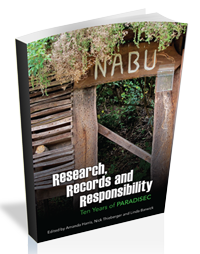Research, Records and Responsibility: Ten years of PARADISEC
Browse by

The Pacific and Regional Archive for Digital Sources in Endangered Cultures (PARADISEC) has been on the cutting edge of digital archiving, building a significant historical collection and community of practice engaged in the preservation and accessibility of research materials.
Over the ten years of PARADISEC's operation, the repository has grown to represent over 860 languages from across the world, including cultural materials from the Pacific region and South-East Asia, North America, Africa and Europe. With over 5000 hours of audio, the extent of the archival material, as well as the inclusion of a variety of styles such as songs, narratives and elicitation, has resulted in an invaluable resource for researchers and communities alike.
PARADISEC's innovation in archival practice allows communities to access original recordings of their own cultural heritage, and provides fieldworkers with a wealth of primary material.
Research, Records and Responsibility explores developments in collaborative archiving practice between archives and the communities they serve and represent, incorporating case studies of historical recordings, visual data and material culture. It brings together the work of Australian and international scholars commemorating ten years of PARADISEC, and reflects on the development of research and language archiving.
About the editors
Amanda Harris is Research Associate and Operations Manager at PARADISEC, University of Sydney.
Nick Thieberger is ARC Future Fellow in the School of Languages and Linguistics at the University of Melbourne and Director of PARADISEC.
Linda Barwick is Professor and Associate Dean Research at the Sydney Conservatorium of Music, and Director of the Sydney Unit of PARADISEC.
Published on 2 October 2015
To purchase a copy go to the SUP site: http://purl.library.usyd.edu.au/sup/9781743324431
Copyright in this material resides with the authors or Sydney University Press, as indicated.
Recent Submissions
-
On the reach of digital language archives
Published 2015-01-01The aim of this chapter is to extend previous work on archival ‘access and accessibility’ (Nathan 2013) in order to make initial suggestions towards a set of criteria for thinking about archives’ ‘reach’ – their multifaceted ...Open AccessBook chapter -
Through the lens of performance and performativity: reframing the research quality and impact of ethnographic digital research archives
Published 2015-01-01Digital research archives such as PARADISEC were established as part of research projects temporarily funded by government research grants. On the tenth anniversary of PARADISEC, its founders, contributors and users are ...Open AccessBook chapter -
The Western Australian New Music Archive: performing as remembering
Published 2015-01-01The curation of WANMA is guided by, and confronts the challenges presented by, such a broad definition, with a focus on constructing a representative canon of Western Australian new music history from 1970 to the present ...Open AccessBook chapter -
KinOath Kinship Archiver: genealogical and social relations
Published 2015-01-01Anthropologists and other researchers often study kin and other social relationships. There have been numerous applications that have tried to meet the needs of researchers in this area. However, there remain numerous gaps ...Open AccessBook chapter -
Reproducable research in descriptive linguistics: integrating archiving and citation into the postgraduate curriculum at the University of Hawai'i at Mānoa
Published 2015-01-01The notion of reproducible research has received considerable attention in recent years from physical scientists, life scientists, social and behavioural scientists, and computational scientists. Some readers will be ...Open AccessBook chapter
